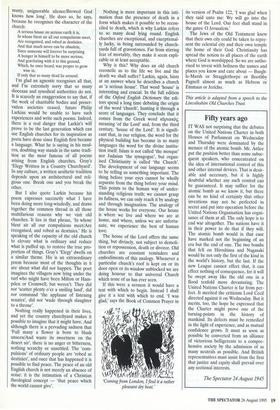Fifty years ago
IT WAS not surprising that the debates on the United Nations Charter in both Houses of Parliament on Wednesday and Thursday were dominated by the menace of the atomic bomb. Mr. Attlee put the position better than some subse- quent speakers, who concentrated on the idea of international control of this and other internal devices. That is desir- able and necessary, but it is highly doubtful whether any such control can be guaranteed. It may suffice for the atomic bomb as we know it, but there can be no kind of certainty that other inventions may not be perfected in secret and put into operation before the United Nations Organisation has cogni- sance of them at all. The only hope is to end war altogether. The nations have it in their power to do that if they will. The atomic bomb would in that case have marked not the beginning of an era but the end of one. The two bombs that fell on Hiroshima and Nagasaki would be not only the first of the kind in the world's history, but the last. If the new League cannot effect that, it can effect nothing of consequence, for it will be swept away like the old one in a flood tenfold more devastating. The United Nations Charter is far from per- fect. It merited the criticism Lord Cecil directed against it on Wednesday. But it merits, too, the hope he expressed that the Charter might prove one of the turning-points in the history of mankind. Its defects must be remedied in the light of experience, and as mutual confidence grows. It must as soon as possible be converted from an alliance of victorious belligerents to a compre- hensive society by the admission of as many neutrals as possible. And British representatives must insist from the first that justice and equity shall prevail over any sectional interests.
The Spectator 24 August 1945


















































 Previous page
Previous page